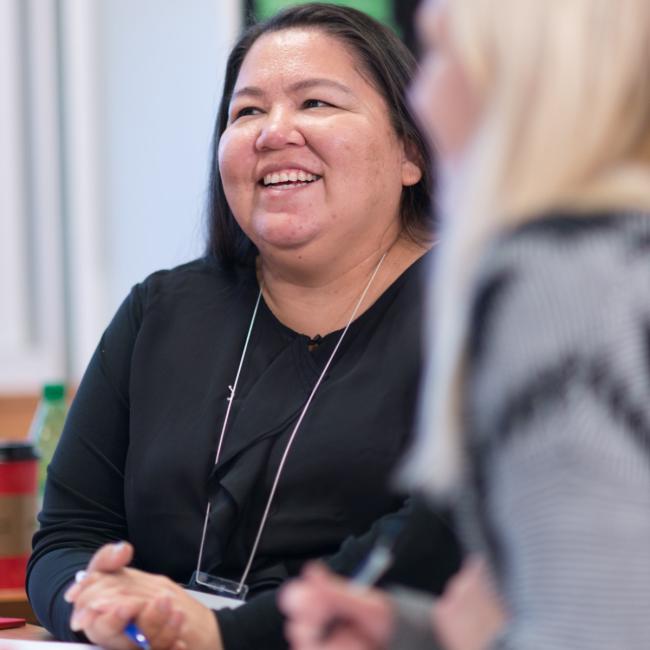We welcome Indigenous and non-Indigenous professional communicators, students of communication, alumni, and community members to learn, connect, and share insights and conversations at the 2023 Gathering on Professional Communication in Indigenous Contexts.
Intentions
- Engage in inclusive discussions about the instrumental role of communication practices in advancing the objectives outlined by the Truth and Reconciliation Commission
- Gain ideas and skills to help collectively work towards a more equitable professional communication practice
- Expand ethical communication in organizations and combat institutional and systemic racism
- Expand the community of practice of Indigenous and non-Indigenous professional communicators, which respects Indigenous contexts and acknowledges the legacy of colonial systems and structures

Gathering schedule & details
The gathering consists of four interrelated sessions that are both in-person and online to allow participants from near and far to join us. We are grateful to come together on the traditional Lands of the Lekwungen-speaking Peoples, the Songhees and Esquimalt Nations.
Oct. 20, 2023
9 a.m. to 12:30 p.m.
Morning Sharing Circle - Elders, Knowledge Keepers, Professional Indigenous Communicators
Participation by invitation only.
1 to 2:30 p.m.
Cedar Weaving Workshop with Haida Artisan Irene Mills (in person)
Learn more and register. Limited to 10 participants.
Land Acknowledgement Workshop with Dr. Wayne Clark (online)
Learn more and register. Limited to 15 participants.
3 to 4:30 p.m.
Afternoon Sharing Circle - Professional Communication in Indigenous Contexts (Online and in person)
Learn more and register. Registration is limited.
Meet the Organizers
Wayne Clark
Executive Director, Indigenous Health Initiatives, Faculty of Medicine and Dentistry, University of Alberta
Dr. Wayne Clark (ᐅᐊᐃᓐ ᑲᓛᒃ) is originally from Churchill and a registered Inuk of the Nunavut Agreement (Tikiraqjuaq/ ᑎᑭᕋᕐᔪᐊᖅ). He is the Executive Director of Indigenous Health Initiatives for the Faculty of Medicine and Dentistry at the University of Alberta. Throughout his career, Dr. Clark worked in various program management roles in the areas of Indigenous health, research, and communications. Dr. Clark completed a Doctor of Education in Distance Education from Athabasca University. His research interests include Indigenous health systems, Indigenous research methodologies, and Inuit Qaujimajatuqangit/ ᐃᓄᐃᑦ ᖃᐅᔨᒪᔭᑐᖃᖏᑦ.
Juli Holloway
Communications Advisor, Tulo Centre of Indigenous Economics
Juli is Haida and Kwakwaka'wakw and has been a guest on the traditional lands of the Secwepemc for 17 years. She has dedicated much of her career to working with Indigenous organizations and First Nations to drive transformative change for First Nation communities and people. Juli is currently the communications advisor at the Tulo Centre of Indigenous Economics. She is also an associate faculty member in the School of Communications and Culture at Royal Roads University and co-teaches Strategic Communications in the Master of Arts in Professional Communication program.
Timothy Kenny
Senior Communications Advisor, Women and Gender Equality Canada (WAGE)
Timothy (Tim) is a mixed-race, non-status, Indigiqueer man who grew up in community housing projects in Edmonton, Alberta. His maternal Indigenous lineage comes from the Jean Baptiste Gambler #183 First Nation in Calling Lake, Alberta. Tim has worked on various Indigenous communications initiatives such as National Indigenous Peoples Day campaigns, Indigenous Reads, Words Matter, and the award-winning Protect Our Elders Campaign. He also participated as a former member/past co-chair of Crown-Indigenous Relation and Northern Affairs Canada (CIRNAC) Communication Branch’s Indigenous Advisory Circle. Before accepting his current role as a Senior Communications Advisor for Women and Gender Equality, Tim worked in the Murdered and Missing Indigenous Women and Girls (MMIWG) Secretariat at CIRNAC, where he was lead support for the 2SLGBTQQIA+ Sub Working Group and their contribution to the recently launched MMIWG National Action Plan.
Alison Tedford Seaweed
Storyteller & Indigenous Relations Consultant
Alison is a ʼNakwaxdaʼxw woman and member of Kwakiutl First Nation. She’s based in Abbotsford, B.C and has over a decade of government experience contributing to culturally sensitive data storytelling, policy analysis, and program development. For the past seven years, she’s been creating information products and strategies that educate, inform, and delight in the private, post-secondary and non-profit sectors. Alison has helped entrepreneurs and brand leaders design their visions of inclusion, strategize about how to get there with practical, concrete action, and find the words to talk about it.
Chaseten Remillard
Program Head, Master of Arts in Professional Communication
Dr. Remillard is a communications scholar interested in questions of social and environmental justice. With expertise in visual and professional communications, Chaseten’s research includes topics as varied as homelessness, Canadian artist Bill Reid, hockey art, the Alberta Oil Sands, and shark films. Despite this eclecticism, he consistently interrogates how images gain and transmit meaning and how these meanings serve to reinforce particular “ways of seeing” ourselves and the world around us.
Gathering Funding
This gathering was funded by a Social Sciences and Humanities Research Council (SSHRC) of Canada Connection Grant and Royal Roads University.